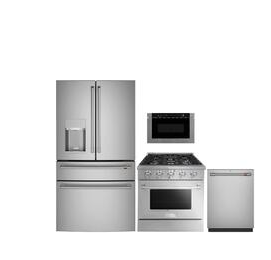What does 'No Frost' mean, and what is it?

Still unsure about what "No Frost" means in this context? Well, don't worry, here's the answer: if you type the phrase into a translator, it will inform you that "No frost" literally translates as "without frost." Instead, we are talking about refrigerators that, unlike the first ones you encountered, do not accumulate ice inside, eliminating the need to manually defrost the appliance and significantly increasing the efficiency of the instrument itself, thanks to, among other things, the improved flow of air within the machine.
What temperature is a No Frost fridge and freezer set?

A No Frost refrigerator should be kept between 4 and 6 degrees Celsius when it comes to temperature. When it comes to frozen food, it is typically stored at temperatures ranging between -18oC and -20oC. On the other hand, these numbers are dependent on a variety of parameters, such as the kind of regulation used by each refrigerator and the sort of food stored within.
Take notice of the following clarifications!
- It is recommended that the optimal temperatures for refrigerators with electronic control,, be between 4 and 6 degrees Celsius. The optimal temperature for the freezer, on the other hand, is between -18oC and -20oC. You can easily select it with the keys on the panels.
- When is it suggested to set the refrigerator temperature to 6 degrees Celsius and the freezer temperature to -18 degrees Celsius? When the temperature in your home is average or when you have just a tiny amount of food in your residence.
- You should choose 4 degrees Celsius for the refrigerator and -20 degrees Celsius for the freezer if the temperature in your home is very high (for example, 35 degrees Celsius or more) or if you have an abundance of food kept.
Does a No Frost refrigerator make noise?

The noise produced by a No Frost refrigerator is entirely acceptable as long as the noises you hear are similar to the following:
- Noises in the form of faint murmurs indicate that the engine is operating correctly.
- Gurgling or hissing noises, which occur when coolant enters the tubes.
- Clicking sounds are produced due to the connection and separation of various components.
- Do you hear any clicks? The reason for this is that the refrigerator is defrosting on its own.
That this device creates some noise to complete its work is unavoidable. And that we hear any of the above is not a reason for panic, but we recall that some may be prevented by positioning the refrigerator correctly. To accomplish this, make sure that it is level, securely supported on the floor, and not rub on any furniture.
How long does a No Frost fridge last?

Considering that the purchase of any significant equipment represents a considerable investment, it is fair that you ask yourself how long a non-Frost refrigerator lasts. You can already anticipate that the answer is not definite: it will rely on factors as vital as correct usage every day or that you properly follow the most basic maintenance they require. Cleaning the refrigerator or taking care of the rubber on the door are two essential items.










